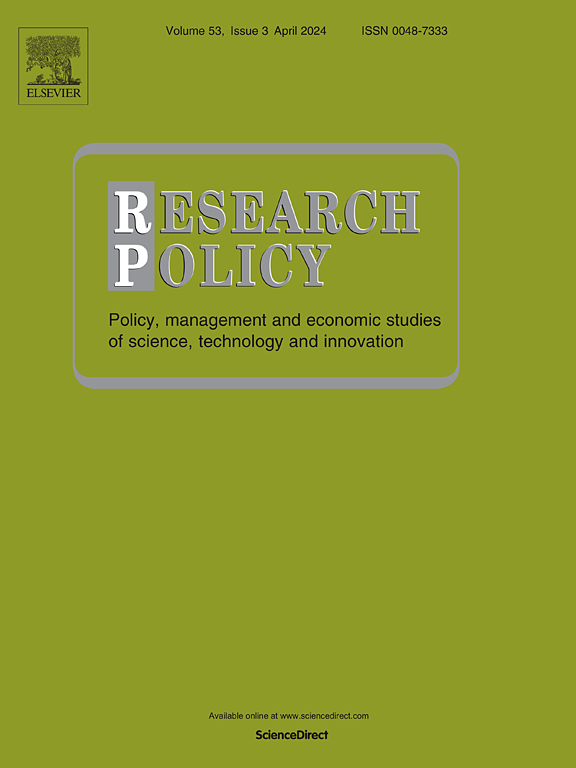Not like the others: Frontier scientists for inventive performance
IF 8
1区 管理学
Q1 MANAGEMENT
引用次数: 0
Abstract
Linking scientific articles in PubMed and corporate biomedical U.S. patents, we study the role of inventors who are frontier scientists, identified as authors of recent articles in top-general biomedical journals. We find that inventions by these “frontier authors” receive more patent citations, are more likely to become technology hits, and have broad technology impact. They are also more likely to be internally further developed by the firm, hold greater private value, and feature broader claims—not only compared to inventions by non-author inventors but also to those by non-frontier authors, including “star” authors. This impact premium is especially strong in scaled-up young biopharmaceutical firms and for frontier authors internally employed at the patenting firm. To better understand the mechanism behind the impact premium of frontier-author patents, we analyze their boundary spanning role. We find that frontier-author patents are more likely to use and to be first users of frontier science. However, while frontier-author patents achieve peak impact when referencing frontier science, this advantage is comparable to other patents that reference frontier science. And as frontier-author patents also enjoy an impact premium on patents referencing other than frontier science, our results, thus, suggest that closeness to frontier science in only part of the story of the superior impact of inventions by frontier scientists.
不像其他人:前沿科学家的创新表现
我们将PubMed上的科学文章与美国企业生物医学专利联系起来,研究前沿科学家的发明家的角色,这些发明家被确定为顶级生物医学期刊上最近文章的作者。我们发现,这些“前沿作者”的发明获得了更多的专利引用,更有可能成为技术热点,并具有广泛的技术影响。它们也更有可能由公司内部进一步发展,拥有更大的私人价值,并具有更广泛的权利要求——不仅与非作者发明家的发明相比,而且与包括“明星”作者在内的非前沿作者的发明相比。这种影响溢价在规模较大的年轻生物制药公司和专利公司内部雇用的前沿作者中尤为明显。为了更好地理解前沿作者专利影响溢价背后的机制,我们分析了它们的边界跨越作用。我们发现,前沿作者专利更有可能使用前沿科学,并成为前沿科学的第一使用者。然而,虽然前沿作者专利在引用前沿科学时达到峰值影响,但这种优势与其他引用前沿科学的专利相当。由于前沿作者专利在引用前沿科学以外的专利时也享有影响溢价,因此,我们的研究结果表明,与前沿科学的接近只是前沿科学家发明产生卓越影响的部分原因。
本文章由计算机程序翻译,如有差异,请以英文原文为准。
求助全文
约1分钟内获得全文
求助全文
来源期刊

Research Policy
MANAGEMENT-
CiteScore
12.80
自引率
6.90%
发文量
182
期刊介绍:
Research Policy (RP) articles explore the interaction between innovation, technology, or research, and economic, social, political, and organizational processes, both empirically and theoretically. All RP papers are expected to provide insights with implications for policy or management.
Research Policy (RP) is a multidisciplinary journal focused on analyzing, understanding, and effectively addressing the challenges posed by innovation, technology, R&D, and science. This includes activities related to knowledge creation, diffusion, acquisition, and exploitation in the form of new or improved products, processes, or services, across economic, policy, management, organizational, and environmental dimensions.
 求助内容:
求助内容: 应助结果提醒方式:
应助结果提醒方式:


